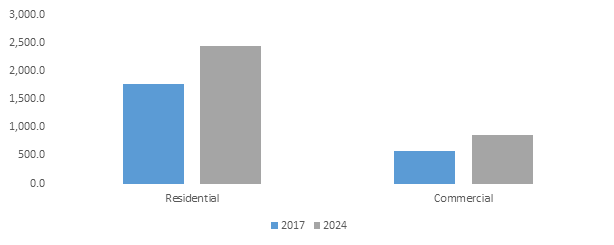Global water heater market to be driven by energy-efficient product trends, solar water heaters to observe commendable commercialization in myriad geographies by 2024
Publisher : Fractovia | Published Date : 2018-11-15Request Sample
Majorly fostered by the rising adoption of energy efficient components in the residential & commercial space, the global water heater market, crossing a valuation of over USD 25 billion in 2017, has emerged as a lucrative growth ground of the overall energy industry. The advent of renewables, IoT, and other smart environmentally responsible technologies, have further impacted the water heating industry for good in terms of new designs, shapes, energy efficiency standards, and more control over the equipment. Aided by these technological advancements, these products have undergone many changes in the recent years, which in turn have prominently impacted the market valuation.
Quite undeniably, water heater is one of the most necessary components in the households and offices, and the rapid urbanization trend across the globe can be claimed as a major beneficiary to its growing demand. The UNCTAD in fact states that by 2050, the world will cater to more than 70% of the global population in urban areas, leading to increased product adoption and thereby impelling global water heater market trends in the coming years. Thriving on the cusp of the prominent urbanization and technological advancement trends, water heater market, by 2024, is further projected to exceed annual deployments of 150 million units and USD 30 billion, in terms of volume and revenue respectively, courtesy – Global Market Insights, Inc.
U.S. Water Heater Market Size, By Application, 2017 & 2024 (USD Million)

Further shedding light on the vast product landscape of this business sphere, the report claims that solar and instant water heaters are gaining exceptional traction around the globe. Favorable regulatory policies and GHG emission control targets are positively impacting the adoption of solar water heaters. Additionally, the growing emphasis on the green growth projects, especially across the residential and commercial establishments, have significantly pushed the product demand in past few years. The UN’s move of 2016 to relaunch the solar housing program that required the installation of solar heaters in new constructions and buildings, stands as a substantiation to the aforesaid statement. The global solar water heater market is said to have vast scope of commercialization in the countries that have an abundance of sunlight.
Speaking along similar lines, it is prudent to mention that the Asian countries are spearheading the developments in overall water heater market. Accounting for a majority of the regional share, China, India, Malaysia, Thailand, and the Philippines, are rapidly expanding in renewables and solar water heaters, given the phenomenal economic boom in the recent years. These high-power Asian markets are further set to draw the attention of the global water heater industry players to invest in the region as they will not want to lag behind in the race.
The Middle East water heater industry is another prominent region witnessing strong growth, and is tendering lucrative returns on investment. The abundance of sunlight & other renewable sources, urbanization trends, and the growing emphasis on producing green energy have positioned this region as the ideal hub for investors to cater to the growing demand for water heaters. Recently for instance, an Italian manufacturer of heating systems, Ariston Thermo, has opened its first manufacturing facility in Bahrain, Middle East. The reports claim that the new facility will have an annual production capacity of more than 250,000 electric water heaters and will be majorly catering to the MEA market. The instance significantly validates the growing popularity of the belt as a valuable investment ground for leading water heater industry companies.
The MEA region as a whole is serving as a strong regional contender for this business sphere, on account of its effective geographical positioning and abundance of natural resources. The regional government, with its supportive energy efficiency and environmental policies, has also been playing a vital role in the expansion of the regional water heater market. The growing regulatory norms and favorable schemes for the record have improved the product adoption trend. For instance, Cyprus, a country in Middle East, has been estimated by the International Energy Agency to have more than 90% of the overall households equipped with solar water heaters.
As more and more geographies are realizing that they should not pursue economic growth at the expense of the environment, the overall growth of water heater market seems to be quite bright in the years ahead. With widespread promotion of renewable energy and companies introducing advanced heating systems that do not use fossil fuels, the remuneration portfolio of global water heater market is certain to traverse along a profitable roadmap in the ensuing years.